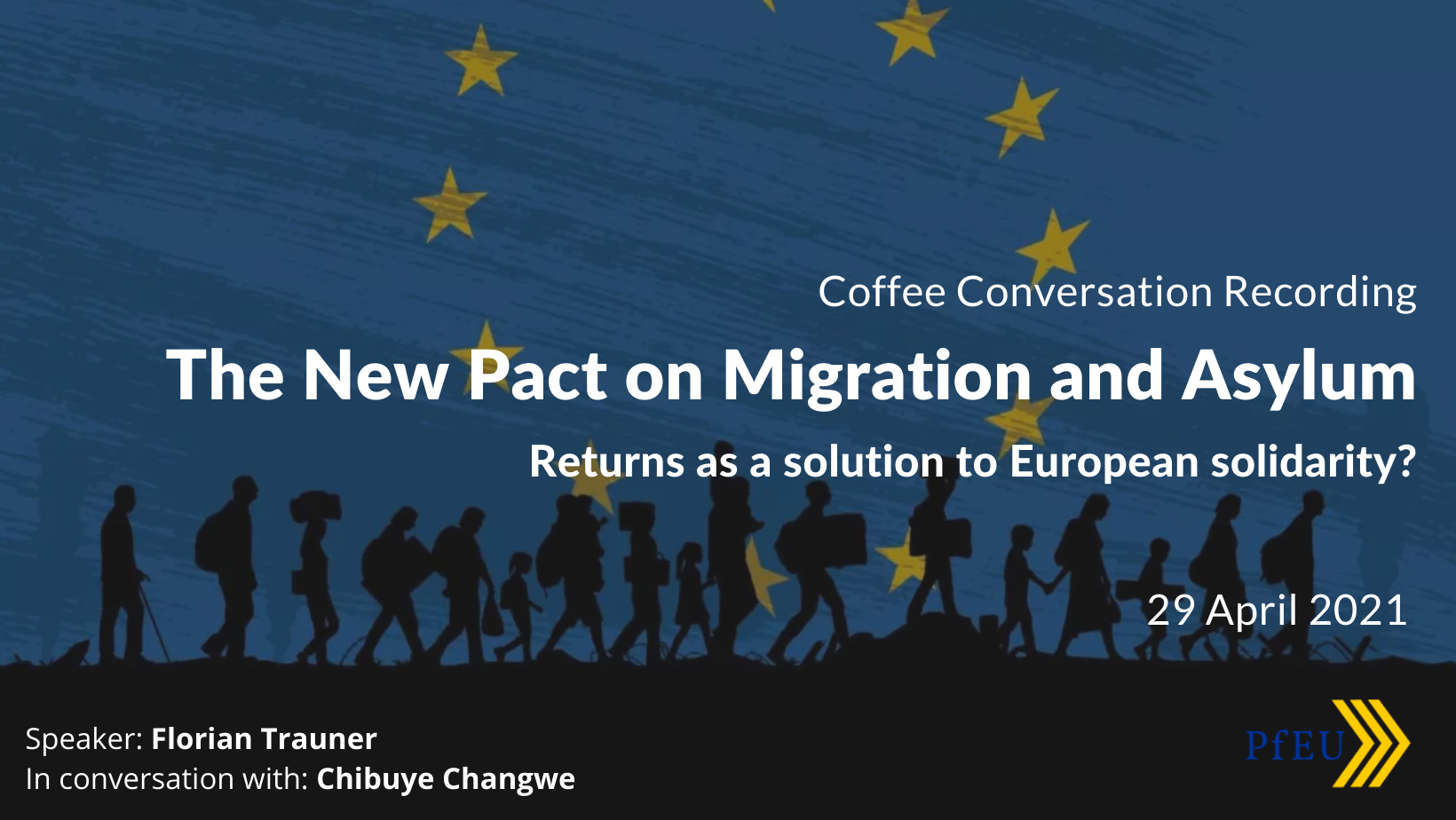
The New Pact on Migration and Asylum: Returns as a solution to European Solidarity?
Event background
The new Pact on Migration and Asylum was released on September 23, 2020. The new framework is envisioned as a fresh start on migration policy within the EU and aims at “building confidence through more effective procedures and striking a new balance between responsibility and solidarity”. Historically, collaboration among Member States regarding migration management has proven difficult within the EU. Many Member States from the Visegrad Group have expressly opposed responsibility-sharing and the relocation of migrants to their territory since the beginning of the 2015 European “migration crisis”.
To overcome this issue and push towards responsibility-sharing between Member States, the European Commission included the concept of “return sponsorship” in the New Pact on Migration and Asylum. This novel concept allows Member States to support other states facing migratory pressure, by sponsoring the return of migrants without a right to stay in the EU instead of relocating asylum seekers into their territory.
Under the new solidarity measure, Member States can commit to return irregular migrants on behalf of other Member States. However, when the return procedure is not successful within 8 months (3 months in times of “crisis”), the irregular migrants would be transferred to the territory of the Member State providing sponsorship with a view to continuing from there the efforts to enforce the return decision. The underlying assumption being that sponsoring Member States will use their bilateral agreements with third countries to push forward the return of irregular migrants.
The concept of return sponsorship is controversial. Though it is targeted at increasing responsibility sharing within Europe it is part of a broader objective: increase the number of returns from Europe. Return sponsorship creates the risk that Member States will favor contributing through returns than through relocation. This makes it unlikely that the existing political division over responsibility-sharing in the EU will be solved.
During this coffee conversation we discussed some important questions regarding this new solidarity mechanism. Whether it is likely that the New Pact on migration will bring a more balanced approach and effectively achieve its goal of solidarity and responsibility-sharing or merely shift the existing polarizing problems among Member States to this newly introduced concept of “return sponsorship”?
Furthermore, we discussed important questions that arise regarding the implementation of “return sponsorship” and its impact in human rights and safeguarding, as well as scrutiny and accountability of existing institutional bodies and future trends in the EU migration policy.
Returns and readmissions is a sensitive area and is closely regulated by international agreements on human rights. The “return sponsorship” increases the likelihood of fundamental rights violations while simultaneously diffusing accountability across the benefiting and sponsoring member state, as well as the relevant EU agencies involved. Under the current migration framework, it is unclear who will be held accountable for the violations of fundamental rights derived from the “return sponsorship” mechanism. Additionally, it risks breaching the “non-refoulement” principle, an essential protection under international human rights, refugee, humanitarian and customary law. For example, returns of members of the LGBTQ community to Pakistan, where it is a criminal offence.
Moreover, it is hard to assess at the moment if the EU and its Member States will be successful in implementing and administering such a complex solidarity framework with its existing institutional organization and tools. Matching the preferred contributions of a sponsor Member State with a border Member State’s needs will be complex and the European Border and Coast Guard Agency (“Frontex”) – dubbed by some academics as “EU’s deportation machine”– is currently under the public eye.
Over the last year, Frontex has been called out by international organizations, such as the IOM, for use of violence against migrants and refugees at the EU’s external borders, and it is currently under investigation by the Frontex Scrutiny Working Group from the European Parliament for alleged violations of fundamental rights. Increasing the participation of Frontex in the “return sponsorship” mechanism at this time might not be the best solution for the migration policy goals of the EU and might further raise doubts of proper migration management in the EU within the international community.
Finally, it is important to note that “return sponsorship” as part of the EU migration policy continues to focus on externalization and global governance partnerships to reduce migration flows coming into the Member States. There is a growing focus on returns in funding, border control externalization and development cooperation to “address the root causes of migration”. This approach reinforces and shifts the solidarity problem among Member States regarding migration from relocation to the return of migrants.
Speaker: Florian Trauner
Florian Trauner is a Professorial Fellow (UNU-CRIS), Jean Monnet Chair at the Vrije Universiteit Brussel and Visiting Professor at the College of Europe. His research interests concern the field of European integration, notably migration, asylum, visa, return and counter-terrorism policies, dynamics of European decision-making and EU external relations. He recently published a discussion paper together with Olivia Sundberg Diez on the effects of the New pact, which inspired this Discussion.
In conversation with: Chibuye Changwe
Chibuye Changwe is a research associate for A Path for Europe (PfEU). In the past she has worked on migrant entrepreneurship, integration of unaccompanied minors and undertaken research on the migration and development nexus, looking at cooperation between the EU and Western African states. With a background in Public Policy, Migration and Development studies, she is currently working in Brussels with the Greens/EFA group at the European Parliament, where she works in the AFET & DROI committee.